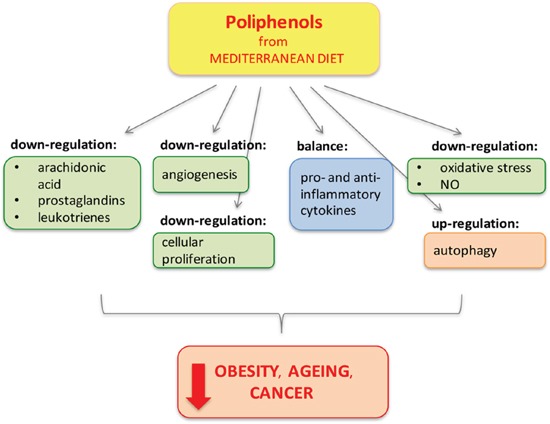You can reduce your risk of cancer by increasing your intake of protective foods and nutrients and minimizing your exposure to toxins and carcinogens. A healthy lifestyle and stress management are keys to decreasing risk as well.
Include and Increase
Avoid or minimize
- Excess alcohol and tobacco smoke
- Excess dietary acid load, e.g., too much meat, cheese, and acid-forming foods without enough alkalizing fruits, vegetables, and legumes
- Preservatives such as nitrates and nitrites and excess salt
- Pesticides and chemical additives
- Processed foods
- Excess red meat, especially processed meats and those cooked at high temperatures (but heated to a safe temperature to kill bacteria)
- Sedentary behaviors and too much screen time!

Polyphenols protect and reduce inflammation by different pathways (through mechanisms of down-regulation, balance and up-regulation) preventing obesity, cancer and age-related diseases, in which inflammation has an important pathological role protect and reduce inflammation by different pathways (through mechanisms of down-regulation, balance and up-regulation) preventing obesity, cancer and age-related diseases, in which inflammation has an important pathological role (Di Daniele 2017).

References
Boffetta, Paolo et al. “Fruit and vegetable intake and overall cancer risk in the European Prospective Investigation into Cancer and Nutrition (EPIC).” Journal of the National Cancer Institute vol. 102,8 (2010): 529-37. doi:10.1093/jnci/djq072
Di Daniele, Nicola et al. “Impact of Mediterranean diet on metabolic syndrome, cancer and longevity.” Oncotarget vol. 8,5 (2017): 8947-8979. doi:10.18632/oncotarget.13553 This is an open-access article distributed under the terms of the Creative Commons Attribution License, which permits unrestricted use, distribution, and reproduction in any medium, provided the original author and source are credited.
Griffiths, Keith et al. “Food Antioxidants and Their Anti-Inflammatory Properties: A Potential Role in Cardiovascular Diseases and Cancer Prevention.” Diseases (Basel, Switzerland) vol. 4,3 28. 1 Aug. 2016, doi:10.3390/diseases4030028
Gullett, Norleena P et al. “Cancer prevention with natural compounds.” Seminars in oncology vol. 37,3 (2010): 258-81. doi:10.1053/j.seminoncol.2010.06.014
Key, Timothy J et al. “Diet, nutrition, and cancer risk: what do we know and what is the way forward?.”
BMJ (Clinical research ed.) vol. 368 m511. 5 Mar. 2020, doi:10.1136/bmj.m511
Reddy, L et al. “Natural products for cancer prevention: a global perspective.” Pharmacology & therapeutics vol. 99,1 (2003): 1-13. doi:10.1016/s0163-7258(03)00042-1
Storz, Maximilian Andreas, and Alvaro Luis Ronco. “Quantifying dietary acid load in U.S. cancer survivors: an exploratory study using NHANES data.” BMC nutrition vol. 8,1 43. 3 May. 2022, doi:10.1186/s40795-022-00537-4
Wiseman, Martin J. “Nutrition and cancer: prevention and survival.” The British journal of nutrition vol. 122,5 (2019): 481-487. doi:10.1017/S0007114518002222
